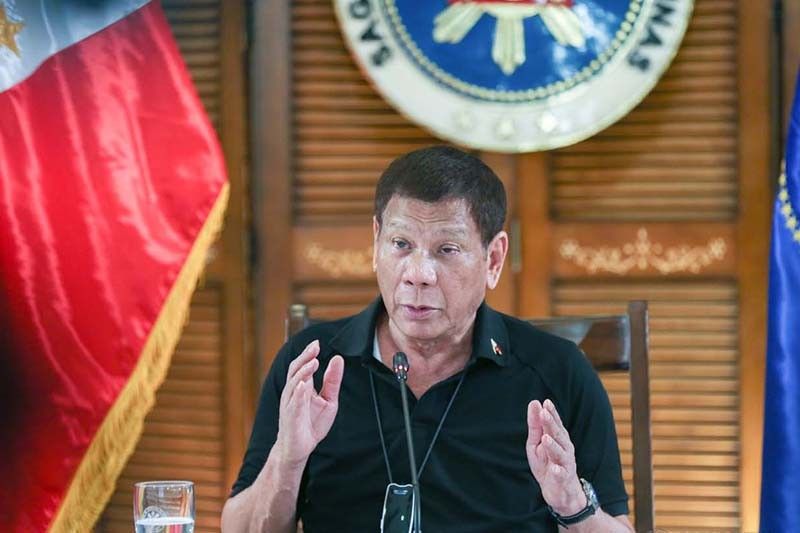Duterte says vaccines from 'friends' China, Russia not for free

MANILA, Philippines — President Rodrigo Duterte said he would ask China and Russia in the Philippines could purchase their potential coronavirus vaccines in instalments.
In a speech late Monday, Duterte thanked Beijing and Moscow for expressing their willingness to provide the country vaccines that could potentially put an end to the health crisis.
“I cannot overemphasize my debt of gratitude,” he said, noting the Philippines will not get the potential vaccines for free.
The president said he may ask for a “credit line” from Chinese President Xi Jinping and Russian President Vladimir Putin if the vaccines are too expensive.
“Bibilhin natin ‘yan. Kaya lang kung mahal, if it is quite expensive then I will ask the—my friend President Putin and President Xi Jinping to give us a credit, parang utang, a credit line but we will pay not in one payment but by instalments,” Duterte said
“I would always tell them that we are willing and if we are short of money by this time because all of the economy of the world, individual countries, have fallen flat,” he added.
Last month, Finance Secretary Carlos Dominguez said the government’s plan is to conduct the vaccination of 20 million people—or 18.5% of the country’s 108 million population. He said the government is allotting P20 billion for the plan to purchase at least 40 million doses of COVID-19.
Duterte has repeatedly asked the public to endure coronavirus restrictions as he pinned the nation’s hopes of returning to normal on a vaccine.
Malacañang last week laid out a schedule for Sputnik V, Russia’s coronavirus vaccine, with the Moscow-funded clinical trials in the archipelago expected to take place from October to March next year despite growing concerns on the vaccine’s safety and efficacy.
If the trials are successful, the country’s Food and Drug Administration may approve the vaccine. It may be deployed in May next year.
The president earlier asked China to give the Philippines priority access to coronavirus vaccines it is developing.
The number of confirmed COVID-19 cases in the country has so far reached 164,474—the highest in Southeast Asia. — Gaea Katreena Cabico
Pharma giants Sanofi and GSK said on July 29, 2020, that they have agreed to supply Britain with up to 60 million doses of a potential COVID-19 vaccine. The agreement covers a vaccine candidate developed by France's Sanofi in partnership with the UK's GSK and is subject to a "final contract."
This thread collects some of the major developments in the search for a vaccine to ease the new coronavirus pandemic. (Main photo by AFP/Joel Saget)
As negotiations towards a new pandemic treaty pick up pace, observers warn of watered-down efforts to ensure equitable access to the medical products needed to battle future Covid-like threats.
Shaken by the pandemic, the World Health Organization's 194 member states are negotiating an international accord aimed at ensuring countries are better equipped to deal with the next catastrophe, or even prevent it altogether.
The process is still in the early stages, with the aim of reaching an agreement by May 2024.
But critics warn that revisions being made to the preliminary negotiating text are weakening the language -- notably in a key area aimed at preventing the rampant inequity seen in access to vaccines and other medical products during the Covid pandemic.
"I think it is a real step backwards," Suerie Moon, co-director of the Global Health Centre at the Geneva Graduate Institute, told AFP. — AFP
Africa's first mRNA vaccine hub is ceremonially launched on Thursday to acclaim from the UN's global health chief, who hailed it as a historic shift to help poor countries gain access to life-saving jabs.
The facility was set up in the South African city of Cape Town in 2021 on the back of the success of revolutionary anti-Covid vaccines introduced by Pfizer/BioNTech and Moderna.
"This precious project... will bring a paradigm shift in addressing the serious problem we faced, the equity problem, during the pandemic, so (that) it's not repeated again," World Health Organization (WHO) head Tedros Adhanom Ghebreyesus tells a media briefing to mark the inauguration. — AFP
China has approved its first locally developed messenger RNA (mRNA) vaccine against Covid-19, its manufacturer said Wednesday, months after the relaxation of strict Covid-zero regulations sparked a surge in cases.
The vaccine, developed by CSPC Pharmaceutical Group Ltd, has been approved for "emergency use" by Beijing's health regulator, the company said in a statement.
It showed high efficacy in a trial in which it was used as a booster shot for people who have been given other types of vaccines, the company added, without offering further details. — AFP
COVID-19 vaccine maker Novavax raises doubts about its ability to continue its business, announcing plans to cut spending after struggles in rolling out its coronavirus jab.
Shares of Novavax plummeted 25 percent in extended trading, after the company reported fourth-quarter earnings that missed analyst estimates.
While the firm should have enough money to fund operations, the situation is "subject to significant uncertainty," it says in a statement. — AFP
The protection against Covid-19 from being previously infected lasts at least as long as that offered by vaccination, one of the largest studies conducted on the subject says.
Ten months after getting Covid, people still had an 88% lower risk of reinfection, hospitalisation and death, according to the study published in the Lancet journal.
That makes this natural immunity "at least as durable, if not more so" than two doses of Pfizer or Moderna's vaccines, the study says.
The authors nevertheless emphasized that their findings should not discourage vaccination, which remains the safest way to get immunity. — AFP
- Latest
- Trending

































